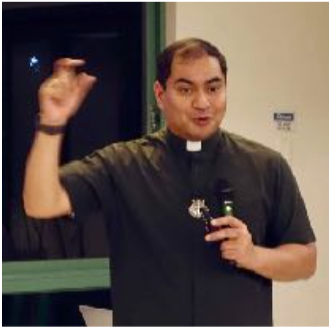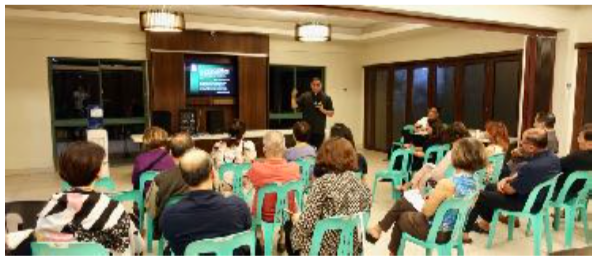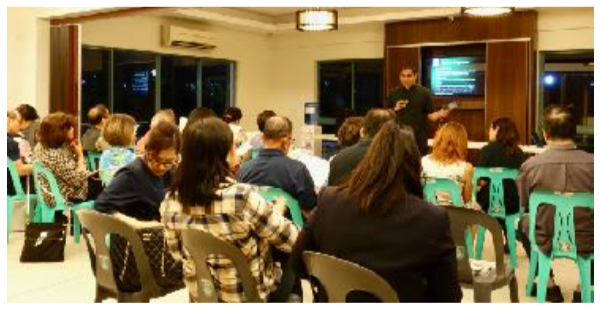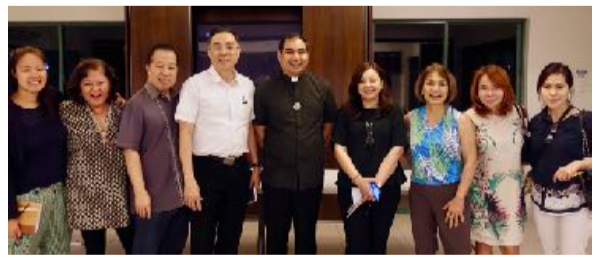Greenmeadows BEC Tackles Bible Basics
Every last Wednesday of the month, the Greenmeadows 1 Basic Ecclesial Community (BEC) group headed by Eileen de Leon, sponsors a formation talk at one of the function rooms of First GreenMeadows clubhouse. The first BEC formation talk was held last January 27 at the GM1 Clubhouse. The facilitator invited by BEC head Eileen de Leon was Msgr. Alex Amante, who talked on the ‘Authority of the Church’. Msgr. Amante is parish priest in the diocese of San Pablo, Laguna and former Vicar General for the San Pablo Diocese. He took his doctorate in Sacred Theology at the University of Navarra, Spain.
For February 27, the formation talk was delivered by Fr. Francis Eugene Fadul Adefuin on the topic, ‘How the Bible Came to Us’. The talk attracted 20 participants, predominantly from Greenmeadows 1 but with a few from the neighboring Acropolis and White Plains.
Fr. Eugene, an Opus Dei scholar, is currently Chancellor of the Diocese of San Pablo and the personal secretary of Bishop Buenaventura Famadico. Fr. Eugene completed his Licentiate in Biblical Theology at the Universidad de Navarra in Pamplona, Spain and is presently taking up his Master of Legal Studies in Civil and Canon Laws at the Graduate School of Law in San Beda University, Manila. He is the current president of the National Association of diocesan Chancellors and a member of the Archicofradia Universal del Apostol Santiago. The speaker was introduced by Henry Sy of the Defensores Fidei Foundation, who began by saying that he and Fr. Eugene are into ‘Apologetics’, which is involved with explaining the faith and not, as most participants thought, about apologizing, given that Catholics are notorious for being the least knowledgeable about the Bible, compared to the other Christian sects.
Henry set the stage for Fr. Eugene’s talk by saying that ‘the Bible is actually a tremendously complex set of books, written over a span of many hundreds of years, by people with very different cultural backgrounds, different languages, and different world views. Certainly, the Holy Spirit inspired each of the Bible’s authors – but that does not mean that the personality or the knowledge of each was overwhelmed by God or that the individual ceased to exist while he was writing. So to ascertain the meaning of so much that is found in scripture, we must seek to understand the assumptions, the perspectives, the languages and the customs of the authors. Only then can we begin to come to an appreciation of the depths of the books we know collectively as the Bible.’
Fr. Eugene first differentiated Protestant vs. Catholic beliefs. While Protestants consider that Scripture alone, or ‘Sola Scriptura’, is the supreme authority in religion, Catholics believe that in God’s supremely wise arrangement, sacred Tradition, Sacred Scripture and the Magisterium of the Church are so connected and associated that one of them cannot stand without the others. Working together, each in its own way, under the action of the one Holy Spirit, they all contribute effectively to the salvation of souls (Catechism of The Catholic Church, No. 95).
While in the Church we greatly venerate the sacred Scriptures, the Christian faith is the ‘religion of the word of God,’ not of ‘a written and mute word, but of the incarnate and living Word’, in the words of St. Bernard of Clairvaux. Consequently, the Scripture is to be proclaimed, heard, read, received and experienced as the word of God, in the stream of the apostolic Tradition from which it is inseparable (Verbum Domini, 7).
‘Tradition’ was first received into the Church by the Apostles who heard it from the Savior’s own lips. These men, under the guidance of the Holy Spirit, handed on by ‘oral preaching, by their example, and by their ordinances, what they themselves had received.’ It was the Apostles and others associated with them who, under the inspiration of the Holy Spirit, committed the message of salvation to writing.
Thus, in order to access the fullness of truth, that is, the deposit of faith given the Church by Jesus Christ, one must consult both Tradition and Scripture. The Gospel is both God’s unwritten and written word, not, rather, simply the written word only.
Further, the spiritual authority of the Catholic Church Christ is just as integral and inseparable from the fullness of truth as is Tradition and Scripture. For without the Magisterium, or teaching authority, of the Church, the fullness of God’s revelation cannot be maintained on earth in its integrity. Classic examples are the concepts of the Trinity and Purgatory that are not found in Scripture.
A major difference is in the number of books that make up the Hebrew, Protestant and Catholic beliefs. The Hebrews have 24, the Protestants have 39, while the Catholics have 46 books. Fr. Eugene also noted that there is a whole spectrum of Bible translations in the marketplace, some good, some very bad. Some translations have been very literal while others have been very paraphrasing. ‘The translator is the traitor’ is an Italian saying which applies very well in this case, since the original material were in Greek, Hebrew and Aramaic; English translators with a less than perfect knowledge of these languages would understandably fall short. The New American Bible, approved for use in the Roman Catholic dioceses of the Philippines, the United States and a few other predominantly Catholic countries, lies in the middle of the spectrum. There are many reasons why certain books had been excluded from the Protestant versions of the Bible, Fr. Eugene explained. For one, Martin
Luther had excluded the Book of Maccabees because it talked about life after death, which he didn’t believe in, as well as the mention of faith with good works – Protestants believe it is only faith.
He also mentioned that the Bible has continued to evolve over the course of two thousand years – for example, verse and chapter numbers were added only in the 1400s.
His most important advice to the audience was – study the Bible. Studying the bible has the purpose of strengthening our faith (allegory), teaching us how to act (moral) and creating our destiny (anagogy). To help in the Catholic’s study of the Bible, he distributed a study plan – the Daily Scripture and Catechism Devotional – to those present.
During the Open Forum, several questions were asked to the satisfaction of all who attended. Among questions asked and advise given were: 1) Not to accept invitations from the other faiths to join them in their Bible studies, since not only do they use Protestant versions but these are ruses to convert you to their faith; 2) that the proper response to allegations that Catholics worship idols which is forbidden in Scripture is that idols are images we create for ourselves
(Baal, fertility gods, etc.) while Catholics have representations of real people who lived before us and who we wish to remember as we pray; and 3) In answer to comments about the Bible not approving repetitious prayer, as what Catholics do when they pray the Rosary, Fr. Eugene defended the Catholic faith by arguing that the real meaning of the original Hebrew phrase was ‘do not utter senseless phrases’, not ‘do not repeat’, as some Protestant translations have included. He also cited ‘Psalms’ which repeat phrases in the text.




